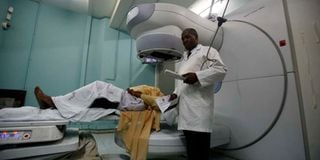Broken machines, no drugs for cancer patients at KNH

A cancer patient undergoing a radiotherapy session at Kenyatta National Hospital on March 23, 2015 following the repair of one of the two radiotherapy machines which had broken down.
The country is staring at a cancer crisis as broken machines and a shortage of drugs at the leading referral hospital has left thousands of patients struggling with the spiralling cost of treatment in private hospitals.
More than 20 different cancer drugs ran out at the Kenyatta National Hospital (KNH) three weeks ago, with patients having to dig deeper into their pockets to seek alternative services at the expensive private facilities.
Three out of seven screening and treatment machines at KNH are out of service due to aging and overuse.
A key radiotherapy machine stalled three years ago and is yet to be fixed. Crucial drugs that are out of stock include radioactive iodine 131 (I-131), Vincristine, Doxorubicin, Mercaptopurine, Allopurinol, Cytoplastin and Cyclophosphamide. Chemotherapy drugs out of supply are Cisplatin, Adriamycin, or its generic variety Rubex.
A source said radioactive iodine for the treatment of thyroid cancer at KNH has been out of stock for more than five years.
Signed for referrals
“This brachytherapy issue is heart-breaking. A national referral hospital without brachytherapy? Is it waiting for the next government to intervene?” posed the source.
Health Cabinet Secretary Mutahi Kagwe said yesterday that KNH had signed for referrals with MP Shah, Aga Khan and Nairobi hospitals. To cushion cancer patients from suffering due to breakdown of machines, he said, “KNH has signed agreements with the hospitals to offer services to patients at NHIF-approved rates.”
However, patients who spoke to the Nation said they pay more at the private facilities.
“For radiotherapy, I pay more in [private] hospitals as compared to what they charge at KNH. NHIF pays the standard Sh3,600, but I have to add Sh3,000 for the service,” Ms Margret Maina said.
Out of the 25 sessions that the patient needs, NHIF) covers 20 and patients have to pay for the remaining five sessions.
“When I was receiving treatment at KNH, I knew that, after the 20 sessions, I would have to pay for the remaining five. The situation is different this time as I have to pay more,” Ms Maina said.
Brachytherapy is a type of internal treatment in which seeds, ribbons, or capsules that contain a radiation source are placed in the body, in or near the tumour. It is a local treatment and treats only a specific part of the body. It is often used to treat cancers of the head and neck, breast, cervix, prostate, and eyes.
Combination drugs are used to treat various cancers, including of the breast and leukaemia.
“When I brought my son last week, I was told that the drugs are out of stock and that I should buy them from a private chemist. I have to spend close to Sh106,000 and still pay Sh20,000 for the nurse to administer the drug separately,” Mr Willis Obiero said.






